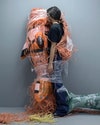When Jackie Nickerson first came to our attention, in 2002, she had put aside a career in editorial fashion work and published an extraordinary book
In a conversation that opens the book, Nickerson remarks that she began thinking about this series in 2014, when Time magazine sent her to Liberia to photograph Ebola care workers. For someone concerned about the impact of plastics on the environment, that experience made Nickerson think about “functionality in a crisis”: “I saw how valuable plastics were, how the barrier PPE created was lifesaving.”
Jackie Nickerson, “Shark”, 2019, from “Field Test” (Kerber Verlag).
© PHOTO © JACKIE NICKERSON. COURTESY OF THE ARTIST AND OF THE JACK SHAINMAN GALLERY, NEW YORK.
But if plastic products are essential to combating the spread of deadly viruses, they still pose long-term dangers to the natural world. Although the Field Test photographs take both these things into account, their view is decidedly dystopian and their black humor can’t cancel out their dead-serious concern. “This whole series is about a kind of collective trauma,” Nickerson says. “The idea that everything is connected, that what we eat and how we produce food is an essential part of life. When we change nature, we change our reality.” To a great degree, the series builds upon another earlier book, Terrain (TF, 2013), in which African farm workers were overwhelmed by the goods they carried. There, Nickerson point out, people “appear camouflaged by their produce, creating a hybrid figure.”
In Field Test, with nature all but absent, these hybrids are unsettlingly alien. Figures are sheathed in polyester mesh, masked in plastic trays, and suited up in head-to-toe laminated polypropylene tarps. One erupts in a white cloud of polystyrene packaging, like frozen breath. The woman in the picture above finds herself bound to inflatable plastic fish with pink nylon cord, more immobilized than protected. As a living sculpture, she resembles one of Rachel Harrison or Erwin Wurm’s comic collisions of the human and the inanimate. But the sense of threat that looms over Field Test undermines the humor here and suggests a nightmarish echo of the erotic encounter in The Creature From the Black Lagoon.
Vince Aletti is a photography critic and curator. He has been living and working in New York since 1967. A contributor to “Aperture”, “Artforum”, “Apartamento” and “Photograph”, he co-wrote “Avedon Fashion 1944-2000”, published by Harry N. Abrams in 2009, and is the author of “Issues: A History of Photography in Fashion Magazines”, published by Phaidon in 2019.

